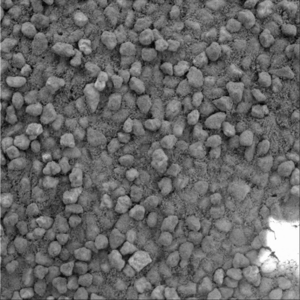Difference between revisions of "Sand"
| Line 1: | Line 1: | ||
| − | [[Image:Cliffhanger Sand.png|right|thumb|300px|"'''Cliffhanger Sand'''" analysed by the rover [[Spirit]]]] | + | Sand is natural unconsolidated granular solid substance composed of grains the size of about 0.05 mm to 2 mm. Sand grains are produced from mineral particles, rock fragments, and, primarily on Earth, degradation of biological structure, such as coral. Most sand is composed of silicate minerals, primarily [[quartz]], or silicate rock fragments. Sand, being a natural mixture, is almost never pure. Sandstone is a rock made from consolidated sandstone.<ref>Sepp, Siim. n.d. [https://www.sandatlas.org/sand/ “What Is Sand?”] Sandatlas. </ref>[[Image:Cliffhanger Sand.png|right|thumb|300px|"'''Cliffhanger Sand'''" analysed by the rover [[Spirit]]]] |
[[category:Materials]] | [[category:Materials]] | ||
| − | + | == Sand on Mars == | |
| − | + | == References == | |
| − | + | <references /> | |
| − | |||
| − | |||
Revision as of 10:54, 8 December 2019
Sand is natural unconsolidated granular solid substance composed of grains the size of about 0.05 mm to 2 mm. Sand grains are produced from mineral particles, rock fragments, and, primarily on Earth, degradation of biological structure, such as coral. Most sand is composed of silicate minerals, primarily quartz, or silicate rock fragments. Sand, being a natural mixture, is almost never pure. Sandstone is a rock made from consolidated sandstone.[1]

"Cliffhanger Sand" analysed by the rover Spirit
Sand on Mars
References
- ↑ Sepp, Siim. n.d. “What Is Sand?” Sandatlas.






